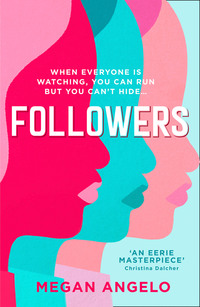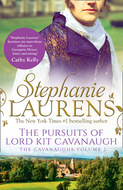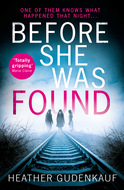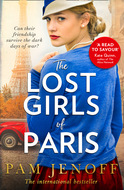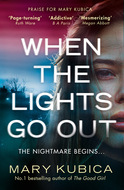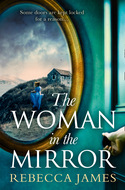Kitabı oku: «Followers», sayfa 3
“Jesus Christ,” Orla hissed. “Floss, he sees us.”
“It’s okay.” Floss took a sip of whiskey. “He lets me use the deck. It’s just his crash pad anyway, ’cause he works here. He really lives in Delaware.” She passed the bottle to Orla.
“But...” Orla looked at the toddler car, then back at the man in the penthouse. He was still watching them. “But it’s weird.”
Floss shrugged. “Whatever. He’s, like, Ukrainian.”
They drank and talked, but did more of the former than the latter, the conversation stalling constantly. Orla sensed that Floss wanted both of them drunker before she said what she wanted to say. Finally, as Orla answered Floss’s demand to know who had lived in her bedroom before her—big-haired Jeannette, with the sportscaster ambitions, then shy Priya, with the endless visiting relatives—Floss cut her off to confess something.
“So, like, I know who you are,” she said. “I mean, I know your name. I just didn’t know that you were my roommate. To be honest, when we met that first day, I forgot your name as soon as you said it—you know how that happens? I decided it was Olga.” Floss spread her hands, swinging the whiskey by the neck. “And here, all along, you were Orla Cadden. I know your work.”
“My work?” Orla repeated. It seemed too grand a term for blogging.
Floss didn’t hesitate. “Sage Sterling,” she said. “Pretty sad, her dying and all.”
“It was sad,” Orla agreed. She actually, absurdly, did kind of miss Sage.
“You wrote about her one hundred and twenty-three times in the last year,” Floss said, swiping her manicured finger over her phone. Orla could see her own name and headshot atop the list of headlines on the screen. “Here’s the one where you listed what was in that salad the paparazzi always snapped her eating,” Floss murmured. “I liked that.”
“It was the best traffic anything on her ever did,” Orla said. “Even better than when I wrote she died.”
Floss waited for a siren to fade, then said: “Do you think you could do that—what you did for her—for me?”
“Um,” Orla said. “I just called the salad place, and they told me what she got. It was just a standard Cobb with edamame, if you think about it.”
“Not that.” Floss took a swallow of whiskey and set the bottle on the edge of the roof. “The first time you wrote about Sage,” she said, “she was just the daughter of some studio executive. She was nobody.”
“Right, but then she started to act,” Orla protested. “She got the Some Like It Hot remake pretty much right away—”
“No.” Floss shook her head hard. A segment of her fake hair was starting to come loose, its sticky root sagging into view. “No, she did not get it right away. First she was in that photo, when all those models went to one of those dumb strip mall places where you drink and paint the same paintings. They Instagrammed it, and you did that post identifying everyone in the picture.”
Orla had forgotten that that was how it started.
“That, just that, was enough to get her a publicist,” Floss went on. “And the publicist got someone to send her those boots, the white leather ones with the rainbow laces. And she wore them, so the boot people sent the pictures to bloggers. You remember getting those pictures?”
Orla nodded. The post she had turned them into was headlined “Sage Sterling’s Boots: Trippy Or Trippin’?” “I don’t think we should say ‘trippin’,’” Orla had protested to Ingrid, before she hit Publish. “I think that’s like a black thing? And we shouldn’t appropriate it? It might seem racist?” Ingrid had overruled her. “You’re the one being racist, trust me,” she had said.
“So then you did a post about her boot style, with photos of all the boots she’d ever worn.” Floss smeared the gloss off her mouth with her palm and wiped it on the back of a cream-colored chair cushion. “You called her a boot icon. A couple months later, the boot people named a style after her, which you covered, which made the boots sell out. So some fashion line invited her to curate—” here, Floss raised her fingers and made air quotes that punctured the air so forcefully, Orla winced on its behalf “—a whole line of boots for them. That got her to Fashion Week. She was supposed to sit in the second row, but her publicist brought sheets of paper with her name printed on them and stole the seats of front-row girls who didn’t show up. That was smart. I liked that move.”
It had grown dark. A floodlight tacked up over the sliding doors went on. It was too bright for the small space, meant to shine over someone’s endless suburban backyard. It might have made Orla homesick, if she wasn’t busy wondering whether the Ukrainian man could now see up her skirt as she leaned over the rim of the building, into the night. She felt thirsty and picked up the whiskey, found it didn’t help.
“You put her in a roundup of Fashion Week It Girls,” Floss went on. “A reader asked you who she was, so you did a post with, like, facts about her. Remember?”
“9 INSANE Facts About Sage Sterling.” Never ten facts—readers hated the number ten. It was too perfect, too choreographed. Suspect.
“And you found that old photo of her with the kid from that boy band, the one who’s hot now,” Floss went on.
“Yeah,” Orla said. “I thought they dated in high school.”
“Wasn’t true,” Floss said, “but it didn’t matter. You wrote it, and then you corrected yourself, but someone had already put it in their Wikipedia pages. I bet you it’s still there now. And the publicists were into it, so they went with it. They made them date.” Floss hugged herself and shivered. It was August, warm enough to be out on a roof near the water, but not warm enough to do it in just shapewear. “And then you really wrote,” she said.
Orla remembered. “Sage and Finn—Uh, We Mean SINN—Step Out Together for the First Time.” “Every Sinn-gle Thing Sage Wore On Tour With Finn’s New Band.” “Sinn Has a Sexy Hawaiian Veterans Day—Pics, Right This Way!”
“And then, Jesus Christ,” Floss said. “She got that haircut, the grandma haircut with the platinum and the curlers.”
“Erm, Marilyn Monroe WHO? Come See Sage Sterling’s New ’Do.” Ingrid had added the “erm” after Orla left the office for the day.
“That’s when she got Some Like It Hot,” Floss said bitterly. She pointed at Orla. “After you said she looked like Marilyn Monroe. She looked like a goddamn Golden Girl!”
Floss sounded so upset that Orla almost apologized. Instead, she reminded Floss that the movie was made by the studio Sage’s dad ran, that she probably would have gotten the part even if he was the only one who knew who she was. “Besides,” she added, feeling suddenly defensive of Sage, patron saint of her disposable income, “are you trying to tell me you’re jealous? She got addicted to heroin and died.”
Floss waved it away. “She got sloppy. I’m not like that.”
Orla stared at her. She thought about going downstairs and into her room, about putting the flimsy fake wall between her and this strange, scheming girl. She thought about telling her super, Manny, about the weirdo in the penthouse, watching young women on his deck when he should have been home with his kid in Delaware.
“This is the part,” Floss said patiently, “where you ask what’s in it for you.”
Orla shook her head. “What could possibly be in it for me?” she asked. “Also, no offense, but you’re a little old to start trying to be famous. I mean, you’re, what...?”
“I’m twenty-eight,” Floss said. “Just like you, right?”
Orla straightened herself with what she hoped seemed like authority, with the air of someone who had put Sage Sterling on the map. “And you’re just now getting into dog apparel parties,” she said.
Floss smoothed her hair away from her face, flicked it over her shoulder. “At least I’m not working at them.”
The line was cruel, but Floss made it sound like a joke they’d had for years. And that was what got Orla—Orla, who had told herself on the day she moved to New York that the hollow way she felt would subside once the cable got hooked up, and who had gone on feeling empty every day for six years.
She said, “What’s in it for me?”
“If we do this right,” Floss answered, “whatever you need. I’m sure you don’t want to blog forever. I’m sure you have, what? A book? So you need an agent. If you help me, if I get as big as I think I can, they’ll want to talk to you just because you’re standing next to me.”
Orla thought of her laptop sitting closed and cool, untouched in the dark of her room. She told herself that as soon as she finished this drink, she would go downstairs and write a thousand words without the TV on. “I don’t need your help with my book,” she said. “I can get an agent on my own.”
Floss laughed. “Oh, really?” she said. “Are you sure? You better be sure. You better be sure that you’re in, like, the top five writers in New York City, and that you know all the people they know, and that those people like you better, and that those people are the right ones to begin with. Because look, Orla.” Floss placed her hands on either side of Orla’s head and pointed it at the building next to theirs, the one that blocked the sky from the rest of the roof. “It’s 10:45 on a Monday night, and everybody in that building has their lights on. You see? They’re all still up. Just like we’re still up. What do you think they’re doing?” She aimed Orla’s head, roughly, at another building beneath them, a low-rise in pinkish-gray brick. “More lights,” she said. “How about them?”
Orla saw a girl in her sports bra bent over her computer, drumming her fingers on her chin.
“I’ve done the math,” Floss said. “I’ve done the actual math. There are eight million people here, and all of them want something as bad as I want what I want, as bad as you want what you want. We’re not all going to get it. It’s just not possible, that all these people could have their dreams come true in the same time, same place. It’s not enough to be talented. It’s not enough to work hard. You need to be disciplined, and you need to be ruthless. You have to do anything, everything, and you need to forget about doing the right thing.” She released Orla with a little shove and put her hands on her hips. “Leave that shit to people in the Midwest.”
They were quiet as the atmosphere sucked up her monologue. Orla steadied herself and looked Floss over. She would never make it as an actress, she thought. She went a little too big, wanted a little too hard. But Floss, it seemed, didn’t want to be an actress. She wanted to be what she already was, even if nobody knew it yet: a celebrity. A person, exaggerated. And her point—the cold slap of the eight million dreams around them—unhooked something in Orla.
“I don’t know,” she said, shakily, finally. “That kind of sounds like bullshit to me.” She tried to hold back a burp and found that it wasn’t a burp at all. She leaned over and threw up on the deck. The whiskey burned twice as hot coming back up. Orla kicked her purse toward Floss. “Can you get me a tissue?” she gasped.
Floss dug through Orla’s bag. “Ohhhh,” she breathed after a moment, tugging something out. “This looks familiar.”
Panting, hands on her knees, Orla squinted up and saw Floss holding, between two egg-shaped nails, Marie Jacinto’s cheap business card. The one Orla had found by the elevator. Orla would never forget that: Floss standing there, grinning at her, flicking the card. She would think of it on that awful last day, as blood bloomed through her shirt and Floss said in a low voice, for once trying not to be heard, that this was the deal, and you know it.
And they did have a deal by then, with lawyers and seals and duplicates, but Orla never felt that the scrawls she made numbly on those documents were as binding as her failure to argue with what Floss said next. Floss put the card back in Orla’s bag carefully, like she wanted it to be safe. She pushed the kiddie car away from the puddle of vomit and walked Orla off of the roof, leaving the mess untouched and the gate wide open behind them. Inside, as they waited for the elevator, Floss grinned and put her face in Orla’s hair. “I don’t think it does sound like bullshit to you,” she said into Orla’s ear. “I think you are like me.”
CHAPTER FOUR
Marlow
Constellation, California2051
When Jacqueline’s event had wrapped, Marlow told her car to take the long way home, hoping she could put off arriving until Ellis had gone to bed. The car obliged and turned onto Clooney Street, which wound lazily through Constellation. Marlow reclined her seat and lay on her side, watching her hometown float by. She was mistily struck, after two cocktails and a glimpse of how stupid-old she looked in a hair bow, by how different Constellation had seemed to her when she was young, when she didn’t know what so much of it was. As a kid, she had seen trees draped with ruby-red leaves in the fall and pure white blooms in the spring. She had seen gentle green hills loping along the back of the town, jutting up into pale coral sunsets that were always on time and spectacular. But the sunsets, she later learned, were staged—lit, from below, by colossal rose-colored lamps in the ground, because the network liked continuity and could not rely on the weather. The hills she had sprawled on as a teenager, bikini’d, enjoying being the only kid in town whose mother let her tan—those were actually fortified shelters, for hiding talent in case of an attack. As for the trees: they turned out to be fake, and fireproof, their mineral wool trunks wrapped in vinyl laminate bark. (Constellation had been built, after all, on top of the scorched wreckage of a county-leveling wildfire.) The leaves and flowers Marlow so loved, she found out, would never have coexisted in one natural species, especially not in California. Their foliage was laser-cut from modacrylics and melamines. When they flooded with color, they did so at the push of a button, at the whim of the network.
But even with all that was choreographed for the cameras, Constellation still had more realness to it than its fans believed. Though Marlow knew people thought the opposite, her life wasn’t technically scripted. There were writers, of course—they lived in the gray-block high-rises on the edge of town, buildings so ugly they seemed designed to remind the writers who they weren’t—but they didn’t decide what came out of Marlow’s mouth. The writers were more like overbearing aunts, giving Marlow broad pep talks on how to be, weeding out her wardrobe. The network execs were both more mysterious and more direct. They lived among the talent, rotating and functioning as watchful extras—not long ago, Marlow had been startled to find the Head of Storyline himself behind the juice bar’s counter, handing her her usual smoothie. They never spoke to the talent out loud, not with the audience watching, but they were constantly in Marlow’s head, bossing her through her device. They let her choose things for herself, but they also closed off plenty of options. It was a little like being a mouse in a maze. She could run as fast as she wanted, but she wasn’t picking the turns.
It took Marlow a long time to see that this was how she had come to marry Ellis. The network had nudged him into the path they knew she’d have to take, a lonely corridor she had been racing down since freshman year of high school, when Hysteryl started sponsoring her and the network began forcing kids to sit with her at lunch. Marlow knew her classmates’ parents had threatened and cajoled them—be nice to her or we’ll get a fine, next semester you’ll be back with your real friends—and the kids always listened. They were always kind. But she could feel the resentment over their assigned seats rising like heat from their skin. No one had sat with her just because they wanted to since Grace. No one had been her friend out of choice since the night she became, as the network put it, “a good fit” for the Hysteryl campaign.
After graduation, everyone else in Marlow’s class was issued their vocational arcs—outdoorsy chef, promiscuous nurse—and sent off for their year of training. But all Marlow got was a memo, telling her she was free to spend her days in any way that kept her happy. So she trailed her mother to the spa. She rearranged the furniture in her room and pretended that it meant she had a flair for interior design. She kept going to ballet class, even though every year the girls got younger and younger than her. Marlow never liked the actual dancing but loved posing in formation with the others. She loved the tiny heh of the shared breath they took just before they started moving, the synchronized thunk of their pointe shoes as they finished a combination. She would let herself imagine that these girls were really her friends, standing close to her on purpose. After class, she would pay attention as the other dancers rolled their tights up to their knees and talked about their classmates. Over time, she learned all the names, all the stories, every corner of an ecosystem she was not a part of. Sometimes, when she was out, she would recognize someone from the ballerinas’ gossip, someone she had never met but felt like she knew so well, it was hard not to say hello. It was the first time she understood the way her followers must feel about her, and the line that came into her mind, as she gazed at these strangers, was always the same: Oh, it’s one of you. From my collection.
Finally, Marlow turned twenty-one and was eligible for real romance. Twenty-one was the age at which the young talent’s random dalliances with each other were replaced with dates staged by the network: amber-lit restaurant dinners of vibrant food that sat untouched, lest the sounds of chewing muddy the audio of the two stars at the table. The network sent Marlow matches each Friday morning, the smirk of a straight, single, network-approved man appearing in her thoughts over breakfast. Would I like to meet him? her device would prompt, and Marlow always said yes. Even though she never ate, Marlow always ordered dessert, just to prolong the experience of being in a place full of happy-looking couples her age. It felt nearly like having friends.
She met Ellis on one of those bad dates. Marlow couldn’t remember, now, the face of the boy she had come to the bar with—this was fourteen years ago—but she remembered that her followers were not enthused by the way he blabbered on about his family’s vineyard. She remembered that, when she let her mind wander and checked her dashboard, 61 percent of her audience thought that she should ditch him immediately.
Over her date’s shoulder, she watched a knot of people orbit a tall, lanky boy with a shock of reddish-brown hair and a stubbled, strong jaw. He wore a T-shirt with tiny holes at the shoulder seams. Eventually, he pushed through a segment of the people around him and joined the line for the bathroom. His friends watched him go, holding their drinks against their chests. When he tossed a joke over his shoulder, they laughed in hearty unison. They held the space where he had been standing open, for when he came back.
“Excuse me,” Marlow said, after watching this scene. She ducked under her date’s arm. “I’m just going to the bathroom.”
She went and stood behind the boy. His face was turned in her direction, but she could tell he was lost in his device. She tried to think of something to say, a way to flare her eyes, that would make him see what he was already looking at. The song that was on in the bar, a woman sounding anxious over bitter guitar, flooded the space between them.
Before she could speak, Ellis snapped to. “I know you,” he said. “I’ve got a poster of you on my wall.” Then he went red, and she laughed. “My cubicle wall,” he clarified. People loved this part of the story, and Marlow had once, too. Now when she looked back on it, she only thought: Of course.
Marlow always said she fell in love that very night—and she did, but not with him. It was the group Ellis drew her into when she followed him back from the bathroom. His hand on the small of her back, he guided her into the space his friends had saved for him. “Everyone, Marlow,” he said. “Marlow, everyone.” Everyone’s faces turned warmly her way. Everyone’s hands clasped hers without hesitation. One boy passed her a beer like it was a napkin, the essence of no big deal. The girls pulled their hair away from their faces and told her their names.
Ellis leaned through the driver’s side window of her car and kissed her before she rode home, hugging her knees to her chest and giggling the whole way about her good fortune: she had met a new crush and all of his friends. As soon as she got home that night, slamming her door on her mother’s questions, she plugged each and every one of them into the neighbors list on her map. Up their symbols popped, all around hers. It astonished her: they had been right there, all around her, these friendly people. And despite her past—despite her breakthrough moment, the thing they all must know she was known for—every one of them treated her like she was normal. Ellis Trieste standing next to her instantly undid years of shunning.
That night, as she lay on her bed, she researched him. She learned that his parents were on the board of the network. They were part of the original group of old-Hollywood producers who invented Constellation, who had moved quickly, in the twenty-twenties, to purchase the stretch of ash it would be built on. She learned that he was business-class talent, which meant he had a real job, not just a few tricks for making it look that way on camera. He was even approved for travel beyond Constellation’s borders; he worked in marketing for a company outside town called Antidote Pharmaceutical, which—more research, propping her legs up on the headboard, jiggling one knee impatiently—happened to be a valued network ad partner. Beneath the stone-faced profile photo of Ellis that Marlow held in her head, scrutinizing each pore, was a tagline. Ask me about Hysteryl. The pill that kept her even, and kept her on the air.
What she told herself as they began to date was: So what? So what if her relationship had been dreamed up by people in a meeting? So what if some ambitious Antidote intern, having studied up on Marlow, had pointed out that she seemed lonely, that she would probably love to date someone who came with a group of friends? So what if some VP of something or other had nodded at the intern’s suggestion, then turned to Ellis and said, “Trieste, you’re single, aren’t you?” So what if Ellis had nodded sagely, ever the company man, and answered, “Sure, I can run point on this.”
So what if these things that she imagined were true? No matter how things had begun, Marlow decided then, she was glad to be with people. Happy to have friends, and proud to have won the unwinnable Ellis Trieste. He confessed to her, early on, that he was a “personality snob”—that his standards were probably too high, that he found most women too dramatic. The frame of reference he gave made it even sweeter, then, when he began to compliment her lack of feeling. He noted how cool she was, for a girl—how even-keeled, how unaffected. But for Marlow, it was no challenge, looking like she didn’t care. Hysteryl kept her emotions like clothes in a neat dresser drawer: stored where they belonged, unfolded only when appropriate, and put back with ease, in order. She was so pleased about earning the label of cool—her, the girl whose reputation could not, for so long, outrun one violent impulse—that she missed what a stupid thing it was, marrying someone to celebrate impressing him.
At their wedding, they were surrounded by the people from the bar the night they met. When the ushers went to seat their friends—bride’s side, or groom’s?—the friends all flapped their hands. They said it didn’t matter; they said they loved them both. Marlow had never been so content.
Then the people went home, and the marriage began. Marlow realized she had been naive to think that they would see their friends as much afterward; they were all marrying, too, and Ellis began to grow tired of, as he called it, “the scene.” Even when he withdrew, Marlow kept up with everyone. She played tennis with them, got massages and manicures with them, helped them plan brunches and showers and parties. She did her best to not be alone with her husband, because a frightening truth was beginning to peel itself back, like paint off a wall: she didn’t like being married to Ellis. He was always on his device while she spoke, working on other things in his head as he stood there, pretending to listen to her. The only time he paid attention to what she was saying was when she talked about her medication—the thing they had in common, the thing he was keeping tabs on. There were small things she hated about him, too, and those were somehow worse, their symbolism metastasizing as the years passed. This one drove her insane, a permanent mental hangnail: he hid the snacks he liked best beneath their bed, so that he didn’t have to share them with her. He would rather risk eating unrefrigerated cheese—cashew cheddar he stashed in the dark next to his snowboard—than let her have some, too. It all added up to an obvious correlation, one she had no business being surprised by: the man with the air of not-caring actually didn’t care.
It went on like this for ten years. Sometimes Marlow thought—from a detached, theoretical distance—about screaming or breaking a dish. But mostly she would call up her map with its crop of contacts, her busy social schedule for the week, and remind herself: Small price to pay. Sometimes she thought it so forcefully, her device mistook it for an intuition. Small price to pay, the soundless voice would repeat. An English expression meaning: a minor sacrifice. Worth the trouble.
The marriage had gone flat, and so had the content they made together. More than once, the network had chastised them for their long dinner silences, their heavy sighs side by side in bed. For Ellis, the matter was doubly serious. Like all network talent, he was obligated to be interesting. And as an Antidote employee, he felt pressure to make sure that his wife—the face of Hysteryl—looked content. But these days, Marlow made no attempt to look content with Ellis. She secretly hoped that her marriage would become so boring to viewers that the network would have to cancel it.
And now Ida, who was supposed to get this season’s divorce plot, was gone.
Someone would have to take over that narrative—the network needed breakups. Ratings on the hetero ones were particularly good, especially with women in the flyover states, forty-five to sixty. The network lavished real budget on such arcs: if Marlow got one, she might even get to go on a trip, despite the no-travel stipulation in her contract. (It was too hard to control her environment beyond Constellation’s borders, to ensure that nothing would dent her mood and, by extension, Hysteryl’s reputation.) She could imagine the ending perfectly, could see herself giving Ellis a poignant goodbye, taking one last look around the home they had shared. She wouldn’t sob or heave, the way her mother would in such a scene. She would stand straight and tall—with a fresh blowout, maybe. She would radiate class and faint optimism. Now, that, she bet, would make her feel thirty-five. She was ready for a new story.

One evening, not long after Jacqueline’s scrunchie party, Marlow and Ellis sat on the couch in silence, watching different films in their heads. Suddenly, their devices perked in unison. Midseason assignments were in.
Divorce c’mon divorce, Marlow begged silently. Divorce, with temporary relocation to Anguilla and personal fitness trainer. Male.
She and Ellis sat forward on the sofa.
Congratulations! Marlow heard in her head. We will be having a baby this season.
Marlow broke the word down into syllables—bay, bee—and found she couldn’t make sense of the term in this context, the context being her life.
Egg storage for female lead Marlow Clipp, aged thirty-five, has reached its expiration date. More details about our baby design process and sowing celebration will be forthcoming.
Bay. Bee.
Marlow tried to picture herself in a hospital bed, Ellis at her side, an infant being lowered onto her chest. She couldn’t imagine them smiling at each other the way the parents always did in these scenes. All at once, Marlow got what this storyline meant. For the first time in her life on camera, she would have to act.
She looked at Ellis, to see how he was taking the news, and found him one step ahead of her. His eyes were wider than she had ever seen them, his smile unfamiliar, with too many teeth on display. He raised a hand and smacked his forehead theatrically.
He knew, Marlow thought. He’s not surprised. And neither was she, when she thought about it. When she remembered the Liberty deal.
Six months earlier, Ellis had come home with a new account. He was overseeing his first merger, he told Marlow proudly. Antidote was acquiring Liberty Family Planning, the company that had long overseen Constellation’s babymaking. Liberty was expanding across the country, and it was Ellis’s job to up their profile on the network, to convince Constellation fans that they should have babies the same expensive way their favorite stars did. The process had three stages: egg reaping, baby design, egg replacement.
“Huge for me,” Ellis had said that day, rapping a rhythm on the table. “Huge for us.”
